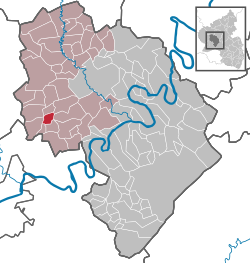Dodenburg
| Dodenburg | ||
|---|---|---|
|
||
| Coordinates: 49°54′50.91″N 06°46′46.43″E / 49.9141417°N 6.7795639°ECoordinates: 49°54′50.91″N 06°46′46.43″E / 49.9141417°N 6.7795639°E | ||
| Country | Germany | |
| State | Rhineland-Palatinate | |
| District | Bernkastel-Wittlich | |
| Municipal assoc. | Wittlich-Land | |
| Government | ||
| • Mayor | Erwin Weber | |
| Area | ||
| • Total | 3.84 km2 (1.48 sq mi) | |
| Elevation | 346 m (1,135 ft) | |
| Population (2015-12-31) | ||
| • Total | 92 | |
| • Density | 24/km2 (62/sq mi) | |
| Time zone | CET/CEST (UTC+1/+2) | |
| Postal codes | 54518 | |
| Dialling codes | 06508 | |
| Vehicle registration | WIL | |
| Website | www.dodenburg.de | |
Dodenburg is an Ortsgemeinde – a municipality belonging to a Verbandsgemeinde, a kind of collective municipality – in the Bernkastel-Wittlich district in Rhineland-Palatinate, Germany.
The municipality lies in the Eifel some 16 km west of Wittlich in the middle of broad mixed forests. It belongs to the Verbandsgemeinde of Wittlich-Land, whose seat is in Wittlich, although that town is itself not in the Verbandsgemeinde.
In 1231, the Archbishop of Trier Theoderich documented and confirmed an accord from Himmerod Abbey with the knight Werner von der Pforte zu Bruch dealing with plots of land in Rodenerde (a long vanished village) “not far from Dodenburg and monastery” (Heckenmünster). Werner von der Pforte was Theoderich von Bruch’s liegeman.
The Dodenburg itself – a castle (Burg is German for “castle”) – had its first documentary mention in Trier documents from 1279 under the name Dudenburg. This moated castle gave the place its name. It was converted between 1791 and 1794 in the Baroque style by the Counts of Kesselstatt. The two-winged building with the round corner towers, which still recall the former moated castle, is likewise today under private ownership. The park complex with its avenues still exists in its original form.
Beginning in 1794, Dodenburg lay under French rule. In 1814 it was assigned to the Kingdom of Prussia at the Congress of Vienna. Since 1946, it has been part of the then newly founded state of Rhineland-Palatinate.
...
Wikipedia



